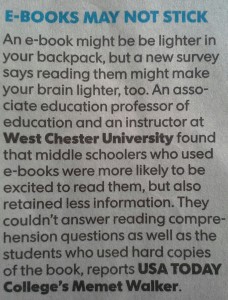eBooks and Reading Retention
- Post By: Eileen Kern
- Date:
- Category: Literature
- Tags: Books, eBooks, Eileen Kern
My mom saved this little article for me from last Sunday’s Asbury Park Press. It looks like it’s from a section called “USA Today for Asbury Park Press.”
This is one of the first studies I’ve seen that has involved child participants in an eBook reading retention study. Although I personally have only encountered coverage of studies that suggest that something is lost by reading a text on a screen, Scientific American suggests that the full story is not that simple:
Since at least the 1980s researchers in many different fields—including psychology, computer engineering, and library and information science—have investigated such questions in more than one hundred published studies. The matter is by no means settled. Before 1992 most studies concluded that people read slower, less accurately and less comprehensively on screens than on paper. Studies published since the early 1990s, however, have produced more inconsistent results: a slight majority has confirmed earlier conclusions, but almost as many have found few significant differences in reading speed or comprehension between paper and screens. And recent surveys suggest that although most people still prefer paper—especially when reading intensively—attitudes are changing as tablets and e-reading technology improve and reading digital books for facts and fun becomes more common. In the U.S., e-books currently make up between 15 and 20 percent of all trade book sales.
The fact that I’ve never seen coverage of a study that has found “few significant differences” may suggest a media preference for the “paper is better” story, or it may simple reflect the views and biases of my news sources.
I have a dedicated e-reader–a first generation NOOK–as well as various devices (computer, smartphone) that are fully capable of displaying eBooks. And while I have happily read books like The Complete Sherlock Holmes, Ted Gup’s A Secret Gift, and Scott Westerfeld’s Uglies series on a NOOK, I have found that my reading retention, best-case scenario, on an eReader simply doesn’t compare to the best-case scenario for paper books.
And I have a similar experience when reading for work as well. A lot of projects that I take on involve an introduction and instruction sheet that’s somewhere between 6 and 50 pages long. For the smaller, simpler projects, it is easy to complete them accurately without printing anything out.
But for the more complicated projects? I feel so much more comfortable printing out the instructions (2-4 sheets per page. Typically not double-sided–I’m too mindful of the chance that I’ll miss something important on the other side of the page. I like to be able to look at everything at once.)
Printing them out lets me interact with them more comfortably: Highlighting key formatting requirements and mandatory topics. Marking which parts of the project require research or input from other stakeholders. Crossing out text that may influence small parts of how I phrase the final project, but doesn’t involve any specific call to action.
Having a physical copy of the complete instructions helps me feel confident that, no matter how complex those instructions are they are, I’ll remember what I need to do and my final product will hit the mark.
If for no other reason, my increased trust in my ability to retain and revisit information on paper would be enough to keep me reading paper books. I could write another article entirely on some of the other pesky issues with eBooks like DRM (in some cases), the difficulty of lending eBooks (even without DRM, I can’t effectively lend an eBook to someone who doesn’t have an eReading device), and the difficulty of using eBooks as a decorative accent (my header image is one of the shelves on the built-in bookshelf in my living room, a mix of books I have and haven’t read.)
But I know a number of my friends and colleagues have happy relationships with their own eReaders, many citing the increased portability, the ability to purchase much-anticipated books at their midnight release rather than waiting for a bookstore to open the next morning, and decreased book clutter.
Do you find that you can retain information just as well when you’re reading an eBook? Do you have different habits (highlighting, bookmarking, etc.) when it comes to eBooks as opposed to paper books? Leave your thoughts in the comments!
